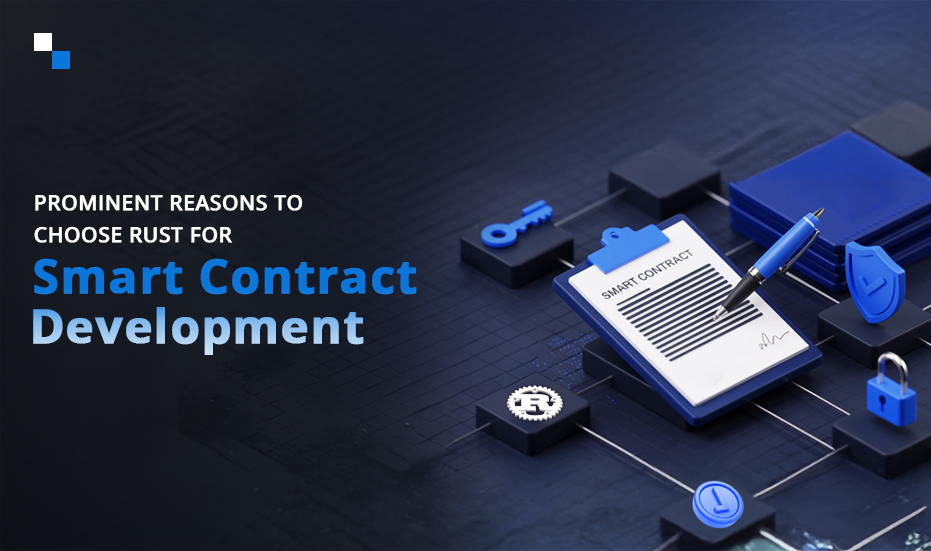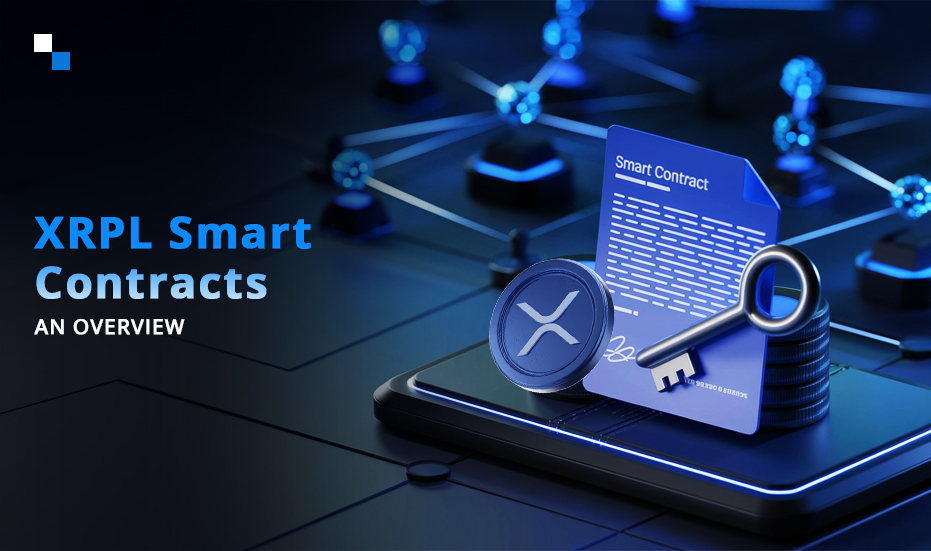In the realm of financial services and banking, the advent of smart contracts has ushered in a paradigm shift, promising to transform the way financial transactions are conducted. Smart contract development allows banking and financial services to offer automation, transparency, and enhanced security to customers.
What are Smart Contracts?
Smart contracts are coded programs that automatically execute predefined actions as soon as specific conditions are met. They operate on a decentralized blockchain network, enabling trustless and transparent transactions without the need for intermediaries. Smart contracts in blockchain are immutable, which means that no one can edit or modify the codes once they are deployed on the blockchain. Thus, it ensures a high level of security and reliability.
Smart Contracts in Blockchain Example:
You buy a coffee using a smart contract, the payment is automatically sent to the vendor once you confirm your purchase. This eliminates intermediaries, reduces fraud risk, and increases transparency. Smart contracts also ensure the agreement is enforced, eliminating the need for human intervention.
You can consider a decentralized lending platform as one more example of a smart contracts in blockchain. such a platform uses smart contracts to automate the lending and borrowing process without intermediaries. Lenders provide cryptocurrency assets which are pooled into liquidity pools. Borrowers can then take out loans from these pools by putting up collateral. The smart contract automatically executes the terms, calculating interest rates, managing collateral levels, and enabling liquidations if collateral runs low.
Different Types of Smart Contracts
Let’s discuss various types of smart contracts in blockchain and how role they play in transforming the financial landscape:
Financial Contracts
These smart contracts facilitate various financial transactions, such as lending, borrowing, trading, and asset management. They automate processes like loan disbursement, interest calculations, and collateral management, reducing the need for manual interventions and improving efficiency. However, it is not as easy to code smart contracts as it sounds. You need to seek the help of a smart contract development company that has a deep understanding of how financial institutions work, so it becomes easier to set the terms and conditions on which the smart contracts are going to function.
Insurance Contracts
Smart contracts can streamline insurance processes by automating policy issuance, premium calculations, and claim payouts based on predefined conditions. This transparency and automation can enhance trust and reduce operational costs.
Identity Management Contracts
In the financial sector, secure identity management is crucial. Smart contract development for decentralized identity management enables users to control their personal data and share it securely with authorized parties.
Supply Chain Contracts
Smart contracts in blockchain can improve transparency, reduce fraud, and facilitate efficient trade finance operations by tracking and verifying the movement of goods and assets across the supply chain.
Escrow Contracts
These act as a secure intermediary, holding funds until both parties fulfill their contractual obligations.
Derivative Contract
These automate the execution of financial derivatives, such as options or futures contracts, based on pre-defined market conditions.
Security Token Contracts
These represent ownership of digital assets like stocks or bonds on a blockchain, enabling secure trading and fractional ownership.
How Can Smart Contracts in Blockchain Benefit Financial Services?
Here’s how banking and financial services are benefited through smart contract development:
- Automation and Efficiency
Smart contracts eliminate the need for manual processing, which reduces the risk of human error and increases operational efficiency. Automated processes can significantly reduce costs and improve service delivery.
- Transparency and Auditability
The immutable and transparent nature of blockchain technology, combined with smart contracts, provides a tamper-proof record of transactions. This enhanced transparency builds trust and enables easier auditing processes.
- Disintermediation
By removing the need for intermediaries, smart contracts can streamline financial processes, reducing costs and increasing speed. This disintermediation can democratize access to financial services and foster innovation.
- Risk Mitigation
The operation of smart contracts in blockchain is based on predefined rules and conditions, reducing the risk of fraud, counterparty default, and other financial risks. This enhanced security can protect stakeholders and promote stability within the financial system.
- Cross-Border Transactions
Smart contracts can facilitate seamless cross-border transactions by eliminating the need for intermediaries and reducing the complexities associated with different jurisdictions and regulatory frameworks.
- Loan Processing and Management
Smart contracts can automate loan origination, underwriting, and repayment. They can ensure compliance with loan terms, trigger default proceedings, and manage collateral.
- Trade Settlement and Clearing
Choosing the right smart contract development company can benefit a business by enabling automated settlement and clearing of trades, reducing counterparty risk, speeding up transaction times, and enhancing efficiency.
- Securities Issuance and Trading
Smart contracts enable the issuance and trading of digital securities, such as tokenized bonds or equity shares. They provide transparent and automated record-keeping, simplifying the issuance process and facilitating fractional ownership.
- Fraud Prevention and Compliance
Smart contracts can establish clear and enforceable rules, reducing the risk of fraud and ensuring compliance with regulatory requirements. They can automate due diligence processes and flag suspicious transactions.
- Cost Savings
Smart contracts can lead to significant cost savings for financial institutions and their customers by automating processes, eliminating intermediaries, and reducing regulatory compliance costs.

Challenges in Smart Contract Development and Their Solutions
- Challenge 1: Security Vulnerabilities
Smart contracts, once deployed, are immutable and challenging to modify. Any vulnerabilities or bugs in the code can have severe consequences.
Solution
Security audits by smart contract development company are crucial to mitigate this risk. It can be done through rigorous testing.
- Challenge 2: Scalability and Performance
As the adoption of smart contracts increases, scalability and performance become critical considerations.
Solution
Solutions like sharding, off-chain computations, and layer-2 scaling solutions can help address these challenges.
- Challenge 3: Legal and Regulatory Compliance
The integration of smart contracts into financial services requires compliance with existing legal and regulatory frameworks.
Solution
Clear guidelines, standardization, and collaboration between industry stakeholders and regulators are necessary to ensure a smooth transition.
- Challenge 4: Interoperability
Solution
Initiatives like cross-chain communication protocols and shared standards can facilitate seamless interaction between different blockchain ecosystems.
- Challenge 5: Talent and Expertise
Developing secure and efficient smart contracts in blockchain requires a specialized skillset and a deep understanding of blockchain technology.
Solution
Investing in talent development, and educational programs, and fostering a vibrant developer community can help address this challenge.
Wrap Up
As the financial services industry continues to embrace blockchain technology and smart contracts, it has opened the doors for innovative solutions to address challenges related to speed, security, trust issues, cost of transactions, and much more.
The potential applications of smart contracts in finance are vast, from revolutionizing traditional banking services to enabling new DeFi models. However, it’s important to approach the integration of smart contracts with a balanced perspective, considering both the opportunities and risks involved. Robust governance frameworks, regulatory oversight, and continuous innovation will be crucial in ensuring the responsible and sustainable adoption of this groundbreaking technology.
Antier, a leading smart contract development service provider is poised to play a pivotal role in shaping the future of financial services and banking. Contact us to automate your financial services using our expertise in developing error-free smart contracts. Let’s bring a change together!





